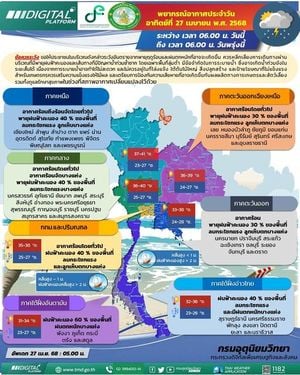Tokyo is stepping up to tackle Japan’s looming population crisis by adopting a bold new approach to working hours. Starting April 2025, government employees will shift to a four-day workweek, allowing for greater flexibility and work-life balance. This significant change aims not only to lighten the burden on working parents but also to increase the nation’s plunging birth rates.
Tokyo Governor Yuriko Koike announced the initiative, stating, "Now is the time for Tokyo to take the initiative to protect and improve the lives, livelihoods, and economy of our people during these challenging times for the nation." The ambitious plan reflects the government's recognition of the urgent need to adapt to changing family structures and societal demands.
Under the new policy, workers will have the option to take three days off each week. Specifically, for families with elementary school children, there's the option to reduce working hours, albeit with some minor salary adjustments. The goal is to make parenting responsibilities more manageable, hopefully leading to more couples considering having children.
Japan's demographic situation is alarming, with the fertility rate plummeting to just 1.2 children per woman as of 2023, well below the 2.1 replacement level needed to maintain population stability. For perspective, only 727,277 births were recorded last year, marking the lowest figure since data collection began. Government efforts over the years to incentivize childbirth through financial support and parental leave have seen limited success.
Sociologists attribute the low birth rates to various factors, one being Japan’s long-standing work culture, renowned for its demanding hours and high-pressure environments. This work climate often forces women to choose between their careers and motherhood. Data from the World Bank indicates there’s also a substantial gender disparity affecting families; female workforce participation stands at around 55%, compared to 72% for men. This gap complicates career and family management for many women.
The flexibility introduced by the four-day workweek is part of broader reforms aimed at addressing these issues. Koike expressed optimism, noting, "Flexibility in work styles is absolutely necessary." She emphasized the importance of ensuring no individual should have to choose between advancing their career and their family obligations.
Driven by these concerns, the Tokyo initiative isn't happening in isolation. It draws from broader global trends advocating for reduced working hours, exemplified by the 4 Day Week Global initiative, which revealed substantial employee support for shorter workweeks. More than 90% of participating workers from trials indicated they wanted to continue with the four-day schedule, highlighting benefits of improved work-life balance and enhanced mental and physical well-being.
Countries like Singapore are also adjusting their work policies, introducing guidelines to encourage flexible arrangements, including staggered hours and shorter workweeks. Such moves are seen as pivotal to responding to changing lifestyle priorities among younger populations across the globe.
Back at home, Koike’s plan could potentially serve as a template for other regions grappling with similar demographic challenges. The Tokyo government hopes this shift will catalyze broader conversations around work-life balance and encourage not just parents but also younger individuals to start families.
Advocates for work-life balance have long argued for structural changes to accommodate families without compromising professional advancement. The four-day workweek is framed as part of this necessary progression and could set precedent across different industries within Japan.
With Japan facing severe economic ramifications from its declining birthrate—a slower workforce means less economic productivity—the government appears committed to implementing measures like this one. The Tokyo Metropolitan Government’s creative workaround aims to provide families with the support they need to participate fully in both work and family life.
Despite the prevailing apprehension surrounding financial pressures associated with raising children, Koike remains hopeful: “We must take this step to make Tokyo livable and desirable for young families.” The city’s commitment to reshaping its working culture could lead not only to increased birth rates but potentially spark similar discussions across various sectors within Japan.
While challenges lie head, the transition to a four-day workweek signifies Tokyo’s ambition to respond proactively to societal demands and demographic shifts. The goal is clear: to encourage family growth, ease the pressures on working parents, and reshape the city’s future.
Experts and citizens alike will be watching closely as this initiative rolls out and evolves. Only time will tell if this bold step can help reverse Japan's troubling demographic trends and create a more balanced life for its residents.



